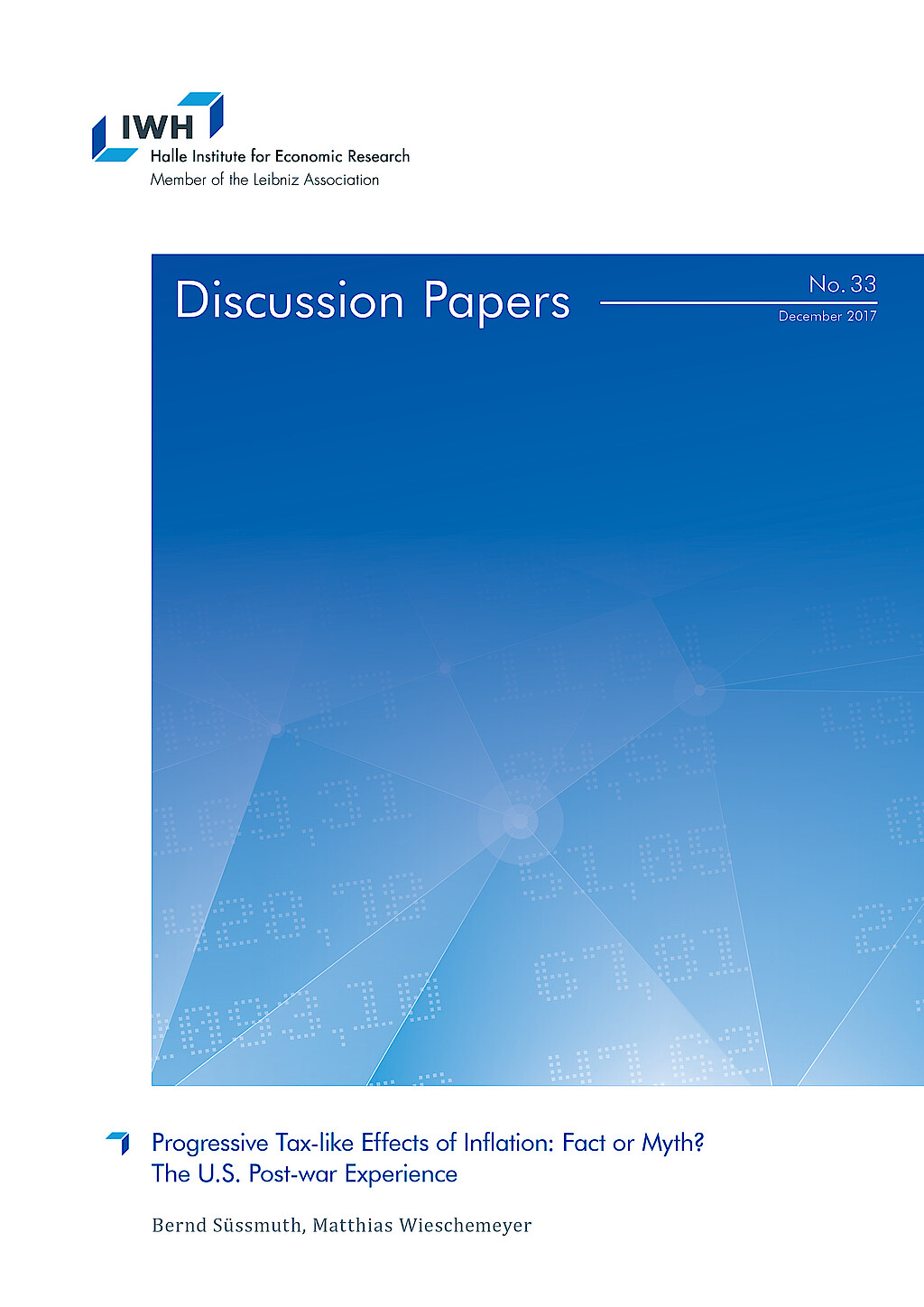Ökonometrische Methoden für wirtschaftliche Prognosen und Simulationen
Der Forschungsschwerpunkt der Forschungsgruppe liegt in der Entwicklung ökonometrischer Methoden für Kurzfristprognosen (Reduzierte-Form-Modelle), für Regionalisierung und für Langfristprojektionen sowie für strukturelle Prognose- und Simulationsmodelle (DSGE-Modelle). Ferner erstellt sie ökonometrische Hintergrundanalysen für die Prognosetätigkeit der Forschungsgruppe Makroökonomische Analysen und Prognosen. Im Rahmen von Drittmittelprojekten wurden verschiedene makroökonomische Modelle, bspw. für die Volkswagen Financial Services AG oder im Rahmen von GIZ-Projekten für die Wirtschaftsministerien in Kirgistan und Tadschikistan sowie das Institut für makroökonomische Prognosen und Forschung (IFMR) in Usbekistan entwickelt.
IWH-Datenprojekt: IWH Real-time Database
Forschungscluster
Wirtschaftliche Dynamik und StabilitätIhr Kontakt

- Abteilung Makroökonomik
PROJEKTE
07.2022 ‐ 12.2026
Evaluierung des InvKG und des Bundesprogrammes STARK
Bundesministerium für Wirtschaft und Klimaschutz (BMWK)
Im Auftrag des Bundesministeriums für Wirtschaft und Klimaschutz evaluieren das IWH und das RWI die Verwendung der rund 40 Milliarden Euro, mit denen der Bund die Kohleausstiegsregionen unterstützt.
12.2024 ‐ 02.2026
Macroeconomic Modelling for Energy Investments in Vietnam
Deutsche Gesellschaft für Internationale Zusammenarbeit (GIZ) GmbH
08.2024 ‐ 03.2025
Strengthening Public Financial Management in Vietnam
Deutsche Gesellschaft für Internationale Zusammenarbeit (GIZ) GmbH
01.2023 ‐ 12.2023
Frühzeitige Ermittlung stabiler Ergebnisse zum Bruttoinlandsprodukt bzw. realen Wirtschaftswachstum und der Bruttowertschöpfung auf Länderebene
Landesbetrieb Information und Technik Nordrhein-Westfalen
Das Projekt prüft, ob die Genauigkeit der ersten Schätzung der Bruttowertschöpfung und des Bruttoinlandsprodukts für die Bundesländer erhöht und damit das Ausmaß der nachfolgenden Revisionen reduziert werden kann.
01.2018 ‐ 12.2023
EuropeAid (EU-Rahmenvertrag)
Europäische Kommission
05.2020 ‐ 09.2023
ENTRANCES: Energy Transitions from Coal and Carbon: Effects on Societies
Europäische Kommission
Ziel von ENTRANCES ist es, die Folgen des Kohleausstiegs in Europa zu untersuchen. Wie verändert der Kohleausstieg die Gesellschaft – und wie kann Politik darauf reagieren?
This project has received funding from the European Union’s Horizon 2020 research and innovation programme under grant agreement No 883947.
10.2019 ‐ 01.2023
An Klimawandel angepasste Wirtschaftsentwicklung
Deutsche Gesellschaft für Internationale Zusammenarbeit (GIZ) GmbH
Der Klimawandel wirkt sich stark auf das Wirtschaftswachstum und die Entwicklung eines Landes aus. Das erhöht den Bedarf an verlässlichen und realisierbaren Ansätzen, mit denen die Auswirkungen von Klimarisiken und potenzielle Anpassungsszenarien bewertet werden können. Die politischen Entscheidungsträger*innen in den Planungs- und Wirtschaftsministerien benötigen fundierte Prognosen, um entsprechende wirtschaftspolitische Instrumente zu konzipieren, zu finanzieren und aktiv gegenzusteuern. In den Pilotländern Kasachstan, Vietnam und Georgien werden Klimarisiken bei der makroökonomischen Modellierung berücksichtigt. Die Ergebnisse werden so in den Politikprozess integriert, dass angepasste Wirtschaftsplanungen entstehen können. Das IWH-Team ist verantwortlich für die makroökonomische Modellierung in Vietnam.
07.2016 ‐ 12.2018
Klimaschutz und Kohleausstieg: Politische Strategien und Maßnahmen bis 2030 und darüber hinaus
Umweltbundesamt (UBA)
01.2017 ‐ 12.2017
Unterstützung einer nachhaltigen Wirtschaftsentwicklung in ausgewählten Regionen Usbekistans
Deutsche Gesellschaft für Internationale Zusammenarbeit (GIZ) GmbH
01.2017 ‐ 12.2017
Short-term Macroeconomic Forecasting Model in Ministry of Economic Development and Trade of Ukraine
Deutsche Gesellschaft für Internationale Zusammenarbeit (GIZ) GmbH
01.2016 ‐ 12.2017
Entwicklung eines analytischen Tools basierend auf einer Input-Output-Tabelle
Deutsche Gesellschaft für Internationale Zusammenarbeit (GIZ) GmbH
Das Ziel des Projektes war die Entwicklung eines Exceltools zur Wirkungsanalyse von Politikmaßnahmen in Tadschikistan basierend auf dem statischen Input-Output-Ansatz.
11.2015 ‐ 12.2016
Beschäftigung und Entwicklung in der Republik Usbekistan
Deutsche Gesellschaft für Internationale Zusammenarbeit (GIZ) GmbH
Förderung einer nachhaltigen wirtschaftlichen Entwicklung in ausgewählten Regionen Usbekistans
05.2016 ‐ 05.2016
Rahmenbedingungen und Finanzierungsmöglichkeiten für die Entwicklung des Privatsektors in Tadschikistan
Deutsche Gesellschaft für Internationale Zusammenarbeit (GIZ) GmbH
02.2016 ‐ 04.2016
Makroökonomische Reformen und umwelt- und sozialverträgliches Wachstum in Vietnam
Deutsche Gesellschaft für Internationale Zusammenarbeit (GIZ) GmbH
10.2015 ‐ 03.2016
Improved Evidence-based Policy Making - GIZ Tadschikistan
Deutsche Gesellschaft für Internationale Zusammenarbeit (GIZ) GmbH
Referierte Publikationen

Effects of Incorrect Specification on the Finite Sample Properties of Full and Limited Information Estimators in DSGE Models
in: Journal of Macroeconomics, June 2016
Abstract
In this paper we analyze the small sample properties of full information and limited information estimators in a potentially misspecified DSGE model. Therefore, we conduct a simulation study based on a standard New Keynesian model including price and wage rigidities. We then study the effects of omitted variable problems on the structural parameter estimates of the model. We find that FIML performs superior when the model is correctly specified. In cases where some of the model characteristics are omitted, the performance of FIML is highly unreliable, whereas GMM estimates remain approximately unbiased and significance tests are mostly reliable.

Testing for Structural Breaks at Unknown Time: A Steeplechase
in: Computational Economics, Nr. 1, 2013
Abstract
This paper analyzes the role of common data problems when identifying structural breaks in small samples. Most notably, we survey small sample properties of the most commonly applied endogenous break tests developed by Brown et al. (J R Stat Soc B 37:149–163, 1975) and Zeileis (Stat Pap 45(1):123–131, 2004), Nyblom (J Am Stat Assoc 84(405):223–230, 1989) and Hansen (J Policy Model 14(4):517–533, 1992), and Andrews et al. (J Econ 70(1):9–38, 1996). Power and size properties are derived using Monte Carlo simulations. We find that the Nyblom test is on par with the commonly used F type tests in a small sample in terms of power. While the Nyblom test’s power decreases if the structural break occurs close to the margin of the sample, it proves far more robust to nonnormal distributions of the error term that are found to matter strongly in small samples although being irrelevant asymptotically for all tests that are analyzed in this paper.

Fiscal Spending Multiplier Calculations Based on Input-Output Tables? An Application to EU Member States
in: Intervention. European Journal of Economics and Economic Policies, Nr. 1, 2012
Abstract
Fiscal spending multiplier calculations have attracted considerable attention in the aftermath of the global financial crisis. Much of the current literature is based on VAR estimation methods and DSGE models. In line with the Keynesian literature we argue that many of these models probably underestimate the fiscal spending multiplier in recessions. The income-expenditure model of the fiscal spending multiplier can be seen as a good approximation under these circumstances. In its conventional form this model suffers from an underestimation of the multiplier due to an overestimation of the import intake of domestic absorption. In this article we apply input-output calculus to solve this problem. Multipliers thus derived are comparably high, ranging between 1.4 and 1.8 for many member states of the European Union. GDP drops due to budget consolidation might therefore be substantial in times of crisis.

The Halle Economic Projection Model
in: Economic Modelling, Nr. 4, 2012
Abstract
In this paper we develop an open economy model explaining the joint determination of output, inflation, interest rates, unemployment and the exchange rate in a multi-country framework. Our model -- the Halle Economic Projection Model (HEPM) -- is closely related to studies published by Carabenciov et al. Our main contribution is that we model the Euro area countries separately. In doing so, we consider Germany, France, and Italy which represent together about 70 percent of Euro area GDP. The model combines core equations of the New-Keynesian standard DSGE model with empirically useful ad-hoc equations. We estimate this model using Bayesian techniques and evaluate the forecasting properties. Additionally, we provide an impulse response analysis and a historical shock decomposition.

The Performance of Short-term Forecasts of the German Economy before and during the 2008/2009 Recession
in: International Journal of Forecasting, Nr. 2, 2012
Abstract
The paper analyzes the forecasting performance of leading indicators for industrial production in Germany. We focus on single and pooled leading indicator models both before and during the financial crisis. Pairwise and joint significant tests are used to evaluate single indicator models as well as forecast combination methods. In addition, we investigate the stability of forecasting models during the most recent financial crisis.
Arbeitspapiere

Progressive Tax-like Effects of Inflation: Fact or Myth? The U.S. Post-war Experience
in: IWH Discussion Papers, Nr. 33, 2017
Abstract
Inflation and earnings growth can push some tax payers into higher brackets in the absence of inflation-indexed schedules. Moreover, inflation may affect the composition of individuals’ income sources. As a result, depending on the relative tax burden of labour and capital, inflation may decrease or increase the difference between before-tax and after-tax income. However, whether some and if so which percentiles of the income distribution net benefit from inflation via taxation is a widely unexplored question. We make use of a novel dataset on U.S. pre-tax and post-tax income distribution series provided by Pike ty et al. (2018) for the years 1962 to 2014 to answer this question. To this end, we estimate local projections to quantify dynamic effects. We find that inflation shocks increase progressivity of taxation not only contemporaneously but also with some repercussion of several years after the shock. While particularly the bottom two quintiles gain in share, it is not the top but the fourth quintile that lastingly loses.

Outperforming IMF Forecasts by the Use of Leading Indicators
in: IWH Discussion Papers, Nr. 4, 2014
Abstract
This study analyzes the performance of the IMF World Economic Outlook forecasts for world output and the aggregates of both the advanced economies and the emerging and developing economies. With a focus on the forecast for the current and the next year, we examine whether IMF forecasts can be improved by using leading indicators with monthly updates. Using a real-time dataset for GDP and for the indicators we find that some simple single-indicator forecasts on the basis of data that are available at higher frequency can significantly outperform the IMF forecasts if the publication of the Outlook is only a few months old.

A Federal Long-run Projection Model for Germany
in: IWH Discussion Papers, Nr. 11, 2012
Abstract
Many economic decisions implicitly or explicitly rely on a projection of the medium- or long-term economic development of a country or region. In this paper, we provide a federal long-run projection model for Germany and the German states. The model fea-tures a top-down approach and, as major contribution, uses error correction models to estimate the regional economic development dependent on the national projection. For the medium- and long-term projection of economic activity, we apply a production function approach. We provide a detailed robustness analysis by systematically varying assumptions of the model. Additionally, we explore the effects of different demographic trends on economic development.

Does Central Bank Staff Beat Private Forecasters?
in: IWH Discussion Papers, Nr. 5, 2012
Abstract
In the tradition of Romer and Romer (2000), this paper compares staff forecasts of the Federal Reserve (Fed) and the European Central Bank (ECB) for inflation and output with corresponding private forecasts. Standard tests show that the Fed and less so the ECB have a considerable information advantage about inflation and output. Using novel tests for conditional predictive ability and forecast stability for the US, we identify the driving forces of the narrowing of the information advantage of Greenbook forecasts coinciding with the Great Moderation.

Is East Germany Catching Up? A Time Series Perspective
in: IWH Discussion Papers, Nr. 14, 2009
Abstract
This paper assesses whether the economy of East Germany is catching up with the West German region in terms of welfare. While the primary measure for convergence and catching up is per capita output, we also look at other macroeconomic indicators such as unemployment rates, wage rates, and production levels in the manufacturingsector. In contrast to existing studies of convergence between regions of reunified Germany, our approach is purely based upon the time series dimension and is thus directly focused on the catching up process in East Germany as a region. Our testing setup includes standard ADF unit root tests as well as unit root tests that endogenously allow for a break in the deterministic component of the process. In our analysis, we find evidence of catching up for East Germany for most of the indicators. However, convergence speed is slow, and thus it can be expected that the catching up process will take further decades until the regional gap is closed.


























